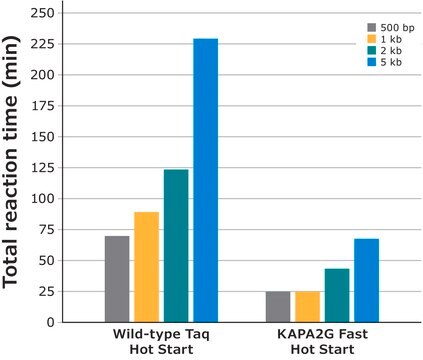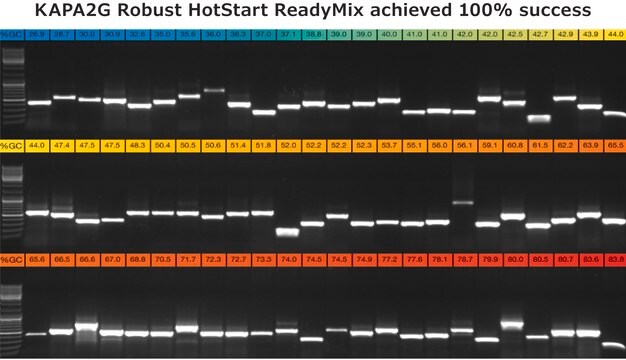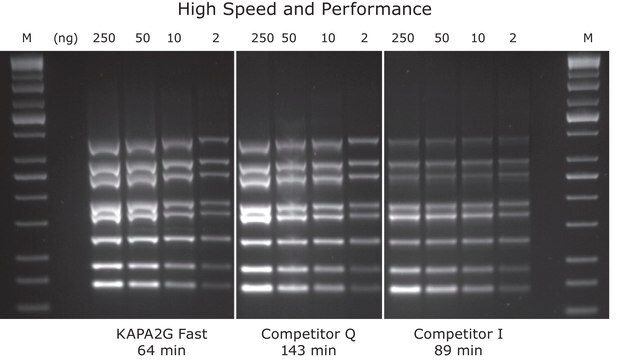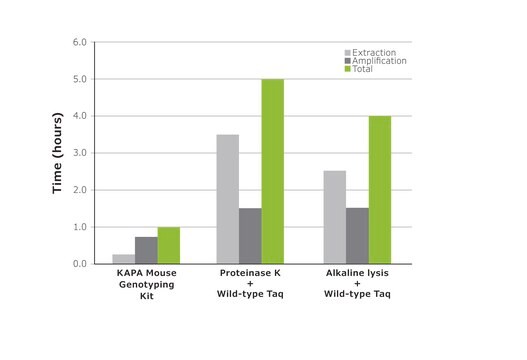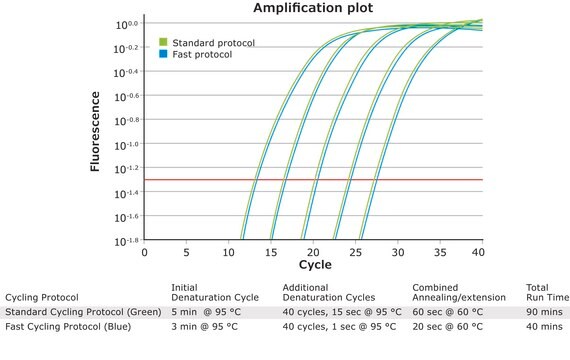2GRNTKB
Roche
KAPA2G Robust PCR Kit
with dNTPs
Sinônimo(s):
PCR
About This Item
Produtos recomendados
Nível de qualidade
uso
sufficient for 200 reactions
sufficient for 500 reactions
prazo de validade
≤12 mo.
Características
Difficult Templates/Specialty Enzymes PCR
dNTPs included
hotstart: no
embalagem
pkg of 100 U (KK5004)
pkg of 250 U (KK5005)
fabricante/nome comercial
Roche
técnica(s)
PCR: suitable
entrada
crude DNA
temperatura de armazenamento
−20°C
Procurando produtos similares? Visita Guia de comparação de produtos
Descrição geral
Aplicação
- Amplification of GC- or AT-rich templates
- Templates containing common PCR inhibitors e.g. salts, urea, SDS, or ethanol
- Crude sample PCR e.g. buccal swabs, cultured mammalian, yeast, or bacterial cells
- Colony PCR
- Polymerase chain reaction
Ações bioquímicas/fisiológicas
Características e benefícios
- Robust performance across a wide range of GC- and AT-rich templates
- Increased PCR success rates
Improved tolerance to common PCR inhibitors
- Efficient amplification from crude samples
- Higher yield and sensitivity per unit of enzyme
Unrivalled performance in colony PCR
- Higher yields and improved consistency of PCR direct from E. coli and yeast cells
Quick Notes:
- KAPA2G Robust PCR Kits with dNTPs contain KAPA2G Robust DNA Polymerase, engineered for high processivity and inhibitor tolerance.
- Both purified genomic DNA and crude samples (e.g. colony PCR) can be used as template.
- Use 0.5 U of KAPA2G Robust DNA Polymerase per 25 μL reaction. More challenging PCRs (GCrich,crude sample) may require higher enzyme concentrations.
- Use 15 sec/kb extension time per cycle, and increase to 30-60 sec/kb for difficult amplicons or templates.
- KAPA2G Buffers contain 1.5 mM MgCl2 at 1X.
- Additional MgCl2 may be added using the 25 mM MgCl2 solution provided in the kit.
- KAPA2G Buffer A is optimized for high yield, specificity, and sensitivity.
- KAPA2G Buffer B is recommended for inhibitor contaminated template samples.
- KAPA2G GC Buffer is recommended for GC-rich PCR (>70% GC).
- KAPA Enhancer 1 can be used with KAPA2G Buffer A or B, particularly for GC-rich assays.
- Reaction products are 3′-dA-tailed and may be cloned into TA cloning vectors.
Qualidade
Nota de preparo
Outras notas
Somente componentes do kit
- KAPA2G Robust Standard or HotStart® DNA Polymerase 5 U/µL
- 5X KAPA2G Buffer A with MgCl2
- 5X KAPA2G Buffer B with MgCl2
- 5X KAPA2G GC Buffer with MgCl2
- 5X KAPA Enhancer 1
- MgCl2 25 mM
- dNTP Mix (optional) 10 mM each
Palavra indicadora
Warning
Frases de perigo
Declarações de precaução
Classificações de perigo
Acute Tox. 4 Oral - Aquatic Chronic 3 - STOT SE 2
Código de classe de armazenamento
12 - Non Combustible Liquids
Classe de risco de água (WGK)
WGK 1
Ponto de fulgor (°F)
does not flash
Ponto de fulgor (°C)
does not flash
Escolha uma das versões mais recentes:
Certificados de análise (COA)
Não está vendo a versão correta?
Se precisar de uma versão específica, você pode procurar um certificado específico pelo número do lote ou da remessa.
Já possui este produto?
Encontre a documentação dos produtos que você adquiriu recentemente na biblioteca de documentos.
Os clientes também visualizaram
Artigos
An overview of directed evolution and the methods for generating proteins with optimized or entirely new functions.
Nossa equipe de cientistas tem experiência em todas as áreas de pesquisa, incluindo Life Sciences, ciência de materiais, síntese química, cromatografia, química analítica e muitas outras.
Entre em contato com a assistência técnica